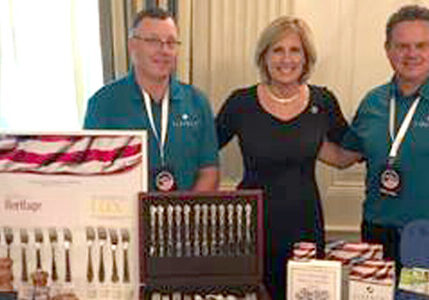Sherrill Manufacturing co-founder gives comments to House committee

*Originally posted on September 16, 2021 by RomeSentinel.com
WASHINGTON, D.C. — The House Small Business Committee heard from Greg Owens, co-founder and CEO of Sherrill Manufacturing and Liberty Tabletop in Sherrill. Owens spoke during the committee’s “National Small Business Week: Celebrating Our Main Street Champions” hearing.
Owens and his business partner, Matt Roberts, started Sherrill Manufacturing in 2005, after flatware producer Oneida Limited moved its manufacturing overseas from upstate New York. Owens and Roberts purchased the company’s old New York factory and hired back many of their former colleagues.
The office of Rep. Claudia L. Tenney, R-22, New Hartford, said in an era when U.S. manufacturing firms are moving to China or elsewhere, Sherrill Manufacturing is an example of what can happen when Americans invest here at home.
Sherrill Manufacturing is now flourishing, with tens of thousands of customers nationwide and supporting more than 50 employees. Sherrill Manufacturing is the only “Made in America” flatware producer in the United States.
“I am honored to have invited Greg Owens to testify before our committee,” Tenney said.
“He embodies the entrepreneurial drive that is so fundamental to the American spirit. Greg and the team at Sherrill manufacturing are a Made in America success story and show what is possible with pro-growth, pro-American policies that invest in domestic manufacturing right here at home,” Tenney added.
“I thank Greg for participating in the hearing today and am honored to recognize all of the hardworking Upstate small businesses during this National Small Business Week,” the New Hartford Republican said.
“The Oneida factory was once the largest flatware manufacturing facility in the world with over 2,300 employees,” Owens said. “Why would Oneida Ltd. decide to scuttle the factory and lay off all of the manufacturing employees? The answer is simple. Unfair competition from China. The math was also simple. After years of fighting to keep the facility alive, Oneida realized that they could purchase manufactured product in a box shipped to Long Beach California cheaper than they could buy the raw material to make it here in the United States. This was possible because Chinese government-owned and subsidized stainless steel mills were selling raw material to their production facilities in China at about half the world market price.”
“While tariffs on steel may be in place to protect the raw material side of the business, there has been little done to protect the manufactured goods side,” he continued.
“This means the Chinese continue to dump subsidized steel into the United States, but instead of doing so in the form of raw material they simply do it in the form of finished products. In the end, American manufacturing businesses, large and small, are unable to compete against the unfair industrial policy of a nation like China, which uses non-market practices to gain advantage and drive foreign competitors out of business,” Owens added.
As a member of the House Small Business Committee, Tenney has introduced the American Innovation and Manufacturing Act, which would expand access to capital for small manufacturers like Sherrill Manufacturing.
View original story here.
